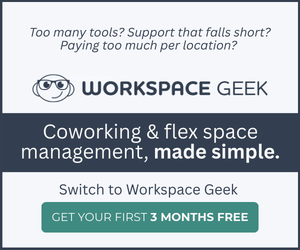- The future of work emphasizes skills-based learning over traditional degrees, with human-centric soft skills becoming vital as AI automates routine tasks.
- AI is seen as a creative partner aiding in brainstorming and problem-solving, while also helping to manage workloads, alleviate burnout, and boost productivity, though perceptions of its impact can differ between executives and employees.
- AI facilitates flexible work environments, supports remote work, and enables personalized work experiences — vital for future work-life balance.
This article is based on the Allwork.Space Future of Work Podcast episode featuring New York Times bestselling author Dan Schawbel. Click here to listen to the full episode.
As the workforce transitions to an AI-centric future of work, agility and forward-thinking strategies will be key to sustainable success.
Dan Schawbel, a prominent New York Times bestselling author and influential voice on LinkedIn, emphasized the importance of agility and foresight in recognizing artificial intelligence (AI) trends on a recent episode of the Allwork.Space Future of Work podcast. With years of experience advising Fortune 100 companies, Schawbel provides an insightful analysis of the ongoing transformation in the labor market driven by AI.
Emphasizing Skills Over Degrees
Schawbel initiated the conversation by highlighting the growing shift in hiring practices towards prioritizing skills-based learning over conventional academic degrees. AI is at the forefront of this change, automating many technical skills and allowing human workers to focus on soft skills such as emotional intelligence, critical thinking, and creativity. These inherently human qualities are becoming indispensable as AI takes on more routine tasks.
Schawbel believes that as AI becomes more human-centric, it will enhance our ability to develop and utilize these soft skills, making them even more valuable in the workplace.
Until now, one of the most valued soft skills in the workplace had been the ability to provide fresh ideas. This in an area where AI enhancing our abilities has immense potential.
Interestingly, Schawbel says that AI can also serve as a creative partner, not just in artistic endeavors but in brainstorming and problem-solving activities. This partnership can potentially open new avenues for creativity and innovation, leading to solutions that might not have been possible otherwise.
The key takeaway is that leveraging our unique human qualities in a world increasingly dominated by AI will be critical for future success.
The Productivity Paradox
Those human qualities that will be critical to using AI successfully are the same qualities that can make incorporating it into work days difficult.
A recent study conducted in collaboration with Upwork reveals a fascinating dichotomy in perceptions of AI’s impact on productivity. While 96% of C-suite executives believe AI boosts employee productivity, 77% of employees feel it has added to their workload. This disparity highlights the need for better education and training on how to effectively utilize AI tools.
“That, to me, was a pretty interesting gap in terms of what’s actually happening versus what executives think is happening with AI,” Schawbel said on the podcast.
The pressure to increase productivity, especially post-economic downturns like the 2008 financial crisis, has only intensified. Companies are expected to do more with fewer resources, leading to longer working hours and heightened burnout. AI is increasingly seen as a tool to alleviate this burden, helping to manage workload and reduce burnout.
Competitive Pressures
The competitive pressure to adopt AI is immense. Every industry leader is now expected to have a clear AI strategy. Schawbel uses the fast-food industry as an example: if McDonald’s adopts AI and gains efficiencies, competitors like Wendy’s or Burger King are compelled to follow suit to remain competitive. This dynamic drives widespread AI adoption across industries globally.
The Rise of Remote Work and Flexibility
COVID-19 catalyzed a reevaluation of work-life balance, with many workers reprioritizing what matters most to them. Research by Schawbel highlighted these changes, especially in the context of AI’s expanding role.
AI is becoming integral to maintaining flexible work environments, offering solutions that range from automated scheduling and virtual collaboration tools to advanced data analytics for decision-making. These technologies enable seamless remote work and can potentially support initiatives like the four-day workweek.
Looking ahead, AI’s influence on the future of work is significant. As AI systems become more sophisticated, they might take on routine tasks, allowing human workers to focus on creative and strategic elements of their jobs. Additionally, AI-driven insights could personalize work experiences, aligning roles and tasks more closely with individual preferences and strengths.
The integration of AI in workplaces is not just a reaction to current demands but a forward-thinking approach to optimizing work environments, driving both productivity and employee satisfaction.
Schawbel’s insights underscore the transformative impact of AI on the future of work. By embracing AI-driven changes, focusing on skills over degrees, and being adaptable, businesses can navigate this new world of work more effectively.

















